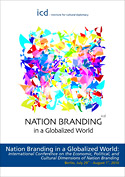Nation Branding in a Globalized World
An International Conference on the Economic, Political, and Cultural Dimensions of Nation Branding
 “Nation Branding in an Globalized World” is an international conference taking place over 4 days that will explore the concept of nation branding and its influence on the processes of globalization and increasing interdependence. The program will consist of lectures, seminars, workshops, debates and panel discussions that will feature leading figures from international politics & diplomacy, academia, marketing & advertising, and civil society. Participants of the program will also have the opportunity to experience Berlin through a series of cultural and social activities.
“Nation Branding in an Globalized World” is an international conference taking place over 4 days that will explore the concept of nation branding and its influence on the processes of globalization and increasing interdependence. The program will consist of lectures, seminars, workshops, debates and panel discussions that will feature leading figures from international politics & diplomacy, academia, marketing & advertising, and civil society. Participants of the program will also have the opportunity to experience Berlin through a series of cultural and social activities. Related to the concept of soft power, a national brand can be understood as the reputation of a country and its population, the things it makes and does, and the way it makes and does them. Although examples of nation branding can be identified much earlier, the systematic analysis and measurement of national reputations has emerged over the last decade; the term “nation branding” was first used by Simon Anholt, the pioneer of the field, in 1998.
The emergence of the concept of nation branding, illustrated by the increasing use of nation branding techniques by the public and private sectors in many countries across the world, generates important issues for discussion for stakeholders in the fields of public diplomacy, cultural diplomacy, and international relations. Firstly, the concept itself must be explored from an interdisciplinary range of perspectives. Secondly, it is important to consider the consequences of individual national brands on the process of globalization and the increasing interdependence of the world. “Nation Branding in an Globalized World” has been developed to address these issues.
Program Agenda
What’s in a brand?
The program will begin by exploring in detail the history and development of the term “Nation Branding”, its definition, and the extent to which the term is open to interpretation. The opening part of the conference will also address the extent to which a country is able to shape its own brand, and what factors may enable or hinder this process.
New Actors, New Strategies
Having considered the meaning of the term “Nation Branding”, the second part of the program will move to analyze the different actors involved in shaping a country’s image abroad - including governments, private sector companies, individuals, and civil society organizations. The interaction between these actors, and the ways in which they can influence a country’s brand, will be considered in detail.
Economic, Political, and Cultural Benefits
The penultimate component part of the conference will explore the advantages for a country of having a strong nation brand – with particular reference to economics, politics, and the cultural sector. Case studies from across the world will be considered by an interdisciplinary group of speakers.
Nation Brands in an Interdependent World
The final part of the program will consider the complex relationship between the process of globalization and the generation of nation brands. It will explore the challenge of combining strong nation brands in an increasingly interdependent world, and will develop best practice guidelines for countries seeking to engage in nation branding.
























































































